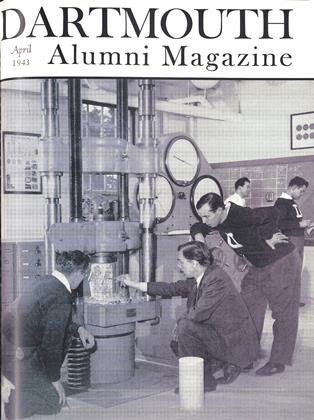Alexander Laing '25, Dartmouth Assistant Librarian, Writes on American Political Problems
By Alexander Laing '25. Duell, Sloan, and Pearce, New York,1943, PP. 375. $3.00.
"Way for America" is an important book. It is a book which, if we are wise, will exercise a salutary influence on our future, for it is full of sound social and political wisdom founded on historical facts. Of all the books I have read dealing with the evils of our time and the possibility of a happier future, this is one of the clearest, simplest, and wisest.
The book is divided into three parts: I. "Ourselves and Our World," dealing with the essential nature of man as man, and as "political animal"; 11. "Principles and Politics," being an account of world politics between the two World Wars: 111. "Ourselves Alone," a discussion of American political behavior during the same period, with specific suggestions for our future behavior.
Mr. Laing's method of procedure is logical, his conclusions convincing. By a clear exposition of historical events and a demonstration of the results of undemocratic practices, he shows what political courses we should follow and what we should avoid, if we really want a better world. He believes in democracy. He believes in the essential integrity and sound moral judgment of the people as a more effective political guide than the mere knowledge of the experts. He believes in the fundamental oneness of ethics and politics, a principle enunciated, by Aristotle and accepted as axiomatic until a century ago. He believes that evil breeds evil and that, in the political realm, as elsewhere, evil leads to disaster. He points out that in social, as in organic, evolution not peace but war is normal and that peace is to be had only by bringing conflicting social forces into stable equilibrium.
Implicitly, this book is an appeal for a return o the Humanities as the informing disciplines of our educational system. It is to be hoped that the author will express his ideas on this subject more explicitly in a later volume.
"Way for America" is not just another Utopia. Though the author writes with moral fervor, he never abandons the reality of historical fact. This is what makes the book at once spiritually and practically significant.
 View Full Issue
View Full Issue
More From This Issue
-
 Article
ArticleDaniel Webster and Dartmouth
April 1943 By CARROLL A. WILSON -
 Lettter from the Editor
Lettter from the Editor'Round the Girdled Earth
April 1943 -
 Article
ArticleDartmouth War Directory
April 1943 -
 Class Notes
Class Notes1918
April 1943 By ERNEST H. EARLEY, RICHARD A. HOLTON -
 Class Notes
Class Notes1939
April 1943 By ROBERT DICKGIESSER, J. MOREAU BROWN -
 Class Notes
Class Notes1931
April 1943 By CHARLES S. MCALLISTER, CHARLES A. GRISTEDE
Royal Case Nemiah
Books
-
 Books
BooksALUMNI PUBLICATIONS
November 1923 -
 Books
BooksFaculty Articles
May 1956 -
 Books
BooksELEMENTARY COLLEGE PHYSICS
May 1937 By G. F. Hull -
 Books
BooksDARTMOUTH VERSE
January 1933 By H. G. R. -
 Books
BooksTRUCKS ... TROUBLE ... AND TRIUMPH.
April 1955 By HERBERT W. HILL -
 Books
BooksQUEST FOR MYTH
December 1949 By Vernon Hall Jr.




